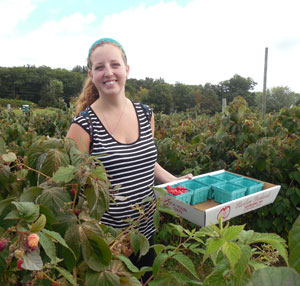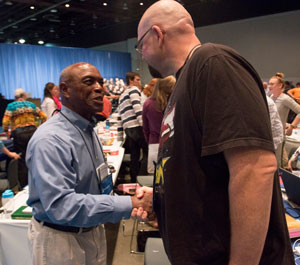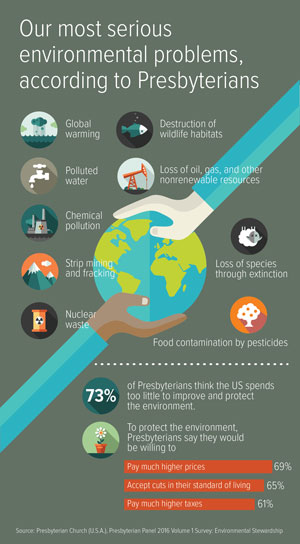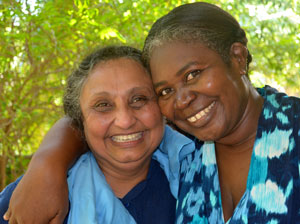Preview of the MAY/JUNE 2016 Issue
 Greening Our Cities
Greening Our Cities
A growing movement to reconcile natural and human communities may reflect a biblical vision for God’s creation.
by Rebecca Barnes
When I was a little girl, the tree in my backyard was the stage for my imagination. I spent hours by that tree, in a parcel of green, in the middle of a medium-sized city. I often didn’t wear shoes—perhaps fitting too nicely the stereotype of a young Kentuckian. I liked the feel of grass under my feet and the gnarled wood against my soles as I stood on my personal platform (a prominent root that surfaced a few feet from the tree). My dad had blackberries, corn, and tomatoes growing against the back fence. All of this somehow created a world where I could block out the noisy traffic of a major street—a stone’s throw from my back fence—and the constant rumble and whistle of trains.
I’ve stayed in the city but connected to the earth, finding places to encounter God, by finding trees and green wherever I can. These safe, peaceful places have given me blessed, private moments to collect my thoughts, utter prayers, and come back to my “center.”
Continue reading Food Justice: A Growing Concern
Food Justice: A Growing Concern
Presbyterians help people in marginalized contexts gain access to affordable, healthy food.
By Tammy Warren
Mary Medina, a PC(USA) Young Adult Volunteer, thought she knew what a food desert was until she participated in a short-term mission trip to New Orleans after Hurricane Katrina. “Then I understood the toll it takes on a community,” she says. “New Orleans is a port city, and there isn’t a lot of opportunity to farm or grow a garden. However, in a place riddled with heart disease, diabetes, and strokes, it’s important to stress how important fresh fruits and veggies are to the health and nutrition of the population,” she says.
In the United States today, 50 million people—one in six—live in a condition of sustained hunger or food insecurity, according to the 2016 Hunger Report, published by the nonprofit Bread for the World Institute, a Christian advocacy group supported by the Presbyterian Hunger Program.
Continue reading A Providential Coincidence
A Providential Coincidence
Belhar and C67: calls to reconciliation ‘for such a time as this’
By Clifton Kirkpatrick
When the 179th General Assembly (1967) convened almost 50 years ago in Portland, Oregon, society was experiencing a time of tumult and massive social change. The Civil Rights Act and the Voting Rights Act had recently been enacted, with churches—especially black churches—leading the call for racial and social justice. Clearly the Presbyterian Church was called upon to act—and it did in a variety of ways, including giving clear expression to our mandate to work for racial justice in the Confession of 1967.
One of the reasons given for holding our next General Assembly in Portland is the importance of celebrating the 50th anniversary of the adoption of the Confession of 1967 in the city where it was adopted. In the prelude to that General Assembly, an overwhelming number of presbyteries endorsed the confession. Although the confession is almost 50 years old, it continues to capture the imagination of the church. Princeton Theological Seminary and Stony Point Center held commemorations to mark the 15- and 35-year anniversaries, respectively, reminding the church of the confession’s continuing relevance. That will again be a major focus as the Assembly gathers in Portland in 2016.
Continue reading Go Figure
Go Figure
Presbyterians and the Environment
by Angie Andriot
God has given humans a responsibility to care for the earth. About 98 percent of Presbyterians agree with this statement, according to a recent study by PC(USA) Research Services. In addition, 90 percent feel that environmental issues are appropriate social concerns for the church.
But are we as a denomination doing enough? The resounding answer is no: 71 percent of Presbyterians believe that the Presbyterian Church (U.S.A.) should become more involved in environmental issues. Climate change tops the list, with 73 percent of Presbyterians agreeing this is one of the most serious environmental issues we face today.
Continue reading A Mission Co-worker’s Journey
A Mission Co-worker’s Journey
Growing Food and Friendships in Haiti
Mission trip and new roundtable conversations lead to transformation.
By Cindy Corell
Our group of six Americans and a couple of Haitians trooped carefully across the field where we admired Roma tomato plants, laden with their ripe, red fruit.
Greeting us in the garden was Rosana Thelusma, smiling as if she’d waited for our visit for a long time.
Fabienne Jean—coordinator of the Presbyterian Hunger Program’s Joining Hands network in Haiti—and I, the network’s companionship facilitator, had brought the delegation from the Presbytery of the James in Virginia to visit partners in the area.
Jean’s job is to run the operations of our network.
My job is to be a liaison with our partners in the United States and to facilitate friendships.
On this February trip, I saw all our work in action!
Continue readingBible Explorations
The Rule of the Last
Have we been interpreting Scripture wrongly all this time?
by Aric Clark
Even when I am sitting alone in a cozy nook with a blanket and a cup of tea, reading is an inherently social act. Not only am I interacting with the thoughts of the author, but also a complex social web informs my reading. That book found its way into my possession through social interactions. Whether literature or nonfiction, it almost certainly belongs to a genre informed by a series of social conventions. Most importantly, my interpretation of the content will be heavily shaped by my experiences and social location. I am a straight, cisgendered, educated, white male. I bring all of that with me to the text.
If this is true of all reading, it is even truer of Scripture, which is frequently read in the communal settings of worship and study, thick with socially constructed rules of interpretation. We never read the Bible alone, and the people we read the Bible with are the most significant influence over how we understand and apply it in our lives.
Continue reading► Read Presbyterians Today’s new blog,
“One Church, Many Voices”
 Presbyterian Resource Guide for Ministry
Presbyterian Resource Guide for Ministry
An easy-to-read, in-depth handbook that puts loads of vital ministry information on dozens of subjects at your fingertips. This one-stop reference is ideal for congregations, presbyteries, and individuals looking for creative ways to improve their ministry.
 Guide for Young Adult Ministry
Guide for Young Adult Ministry
This special issue is a must-read for everyone who wants to better understand young adults and engage them in worship, education, and service.
 Welcome to the Presbyterian Church!
Welcome to the Presbyterian Church!
THIRD EDITION. Presbyterians Today’s special issue and guidebook — “Welcome to the Presbyterian Church!” — is a wonderful introduction and overview of all things Presbyterian.
 What Presbyterians Believe 2
What Presbyterians Believe 2
Volume 2 of Presbyterians Today’s new special issue and guidebook—What Presbyterians Believe 2—brings you even more of our most popular articles all about Presbyterian beliefs, worship, and practice.



